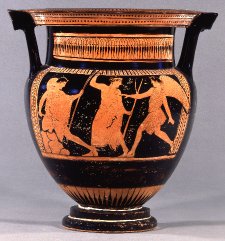
March 6, 2013, by Alan Sommerstein
Furies travelling light
One doesn’t normally think of ancient Greek women (at least if they were of respectable status), let alone goddesses, as showing more than half a leg in public, but here is a goddess doing just that – and what is more, if you believe Apollo (and Apollo, if you believe Apollo, never lies), she is an elderly virgin. On this vase (a column-krater by the Orestes Painter, ca.450-440 BC; British Museum 1923.10-16.10) Apollo (centre) is protecting the fugitive Orestes (left) from a Fury who, with her sisters, is pursuing him to avenge his killing of his mother Clytaemestra; and, as you can see, the Fury wears what can fairly be described as a sleeveless, belted mini-dress. The painting, one of several showing variants of this scene with Furies attired more or less like this, was probably inspired by Aeschylus’ Eumenides, produced in 458, which may well have been the first time that Furies had been seen on stage; the lines on the dress are probably meant to suggest that it is dark – Aeschylus speaks of the Furies’ garments as “dark grey” or “black”. In some respects, however, the artist has been a bit careless. Aeschylus, for example, explicitly says that his Furies do not have wings; what look like horns coming out of the Fury’s hair are actually meant to be serpents (and appear clearly as such in other versions of the scene); and the artist, unlike some of his rivals, has not wound more serpents around the Fury’s arms, and has left Apollo’s laurel bough (in his left hand) leafless as if it were a dead branch picked up from the forest floor. What is entirely deliberate, though, and typical of the whole group of paintings, is that the scene depicted is one that never actually occurs in the play. To be sure, there is a scene in which Orestes, Apollo and the Furies are shown together at Delphi – but the Furies are slumped on chairs, asleep; by the time they awake (roused by the ghost of Clytaemestra) Orestes has gone. The image recalls the Delphi episode as a whole, not any specific moment of it. Orestes will flee to Athens, where he will stand trial for his mother’s murder, and be acquitted on a tied vote; the Furies, after threatening to ruin Athens in revenge, will be appeased by the eloquence of Athena, reclothed in crimson robes (probably of full length) and given a sanctuary and a cult in Athens under the new name of the Awesome Goddesses (Semnai Theai).
No comments yet, fill out a comment to be the first

Leave a Reply